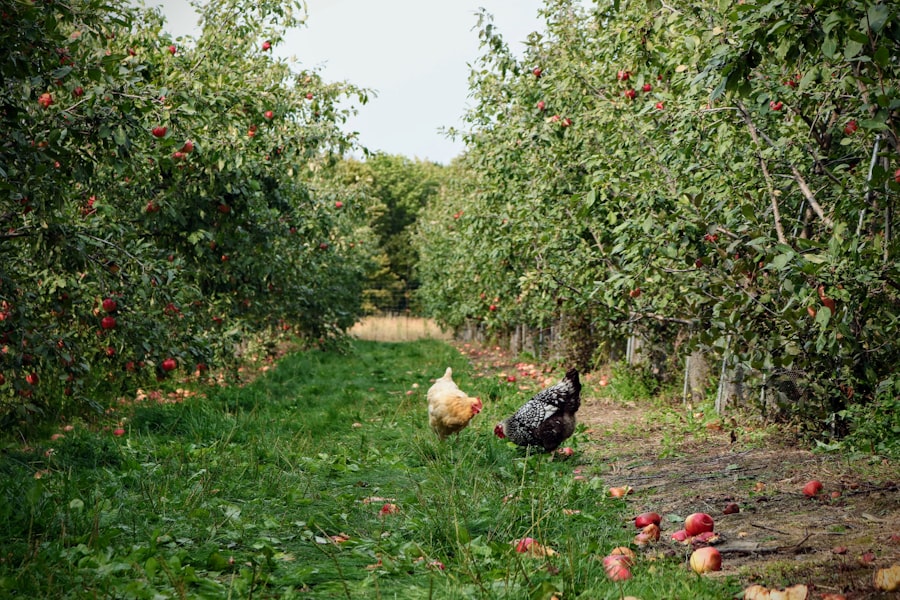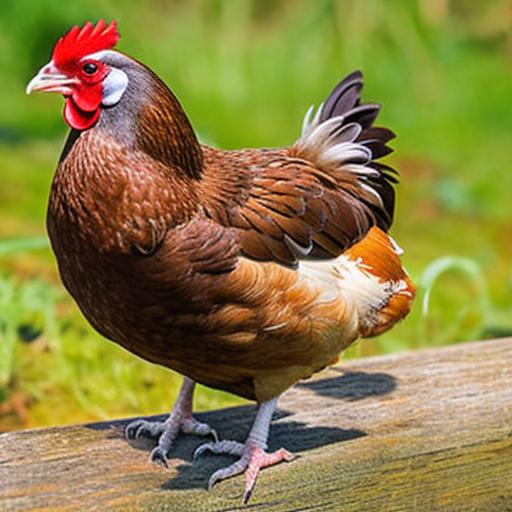Keeping chickens in your backyard has become increasingly popular in Maryland in recent years. Many people are drawn to the idea of having their own flock of chickens for various reasons, including the benefits of fresh eggs, the environmental advantages, and the cost savings. In this article, we will explore the laws and regulations surrounding backyard chickens in Maryland, as well as the benefits of keeping chickens in your yard.
Key Takeaways
- Keeping chickens in Maryland is legal and regulated by state and local laws.
- Keeping chickens in your yard can provide fresh eggs, natural pest control, and fertilizer for your garden.
- Choosing the right chicken breed for Maryland’s climate is important for their health and productivity.
- Building a chicken coop that is safe, secure, and comfortable for your chickens is essential.
- Feeding and caring for your chickens properly can prevent common health issues and ensure their well-being.
Maryland Laws and Regulations on Keeping Chickens
Before you decide to keep chickens in your backyard, it is important to familiarize yourself with the laws and regulations regarding poultry keeping in Maryland. Each county may have its own specific ordinances, so it is crucial to check with your local government for any restrictions or requirements.
In general, most counties in Maryland allow residents to keep a limited number of chickens for personal use. However, there are usually restrictions on the number of chickens allowed, as well as rules regarding coop placement, noise levels, and waste management. Some counties may also require permits or licenses for keeping chickens.
To stay compliant with local ordinances, it is important to keep your coop clean and odor-free, provide adequate space for your chickens, and ensure that they are not causing a nuisance to your neighbors. Regularly check with your local government for any updates or changes to the regulations.
Benefits of Keeping Chickens in Your Yard
There are numerous benefits to keeping chickens in your yard, both for you and the environment. One of the main advantages is having access to fresh eggs. Eggs from backyard chickens are often considered to be healthier and more nutritious than store-bought eggs. They are typically higher in omega-3 fatty acids and vitamins A and E.
In addition to the health benefits, raising chickens can also have positive environmental impacts. Chickens help reduce food waste by eating kitchen scraps and garden leftovers. They also produce high-quality fertilizer that can be used to enrich your garden soil. By keeping chickens, you are contributing to a more sustainable and self-sufficient lifestyle.
Furthermore, raising your own chickens can lead to significant cost savings. While there is an initial investment in building a coop and purchasing chickens, the ongoing costs of feed and bedding are relatively low compared to the price of store-bought eggs. Over time, the savings can add up, making backyard chickens a cost-effective choice.
Choosing the Right Chicken Breed for Maryland Climate
When selecting chicken breeds for your backyard flock in Maryland, it is important to consider the climate and weather conditions. Maryland experiences hot summers and cold winters, so it is crucial to choose breeds that are well-suited to these conditions.
Some chicken breeds that are known to do well in Maryland’s climate include Rhode Island Reds, Plymouth Rocks, Sussex, and Wyandottes. These breeds are hardy and can tolerate both heat and cold. They also tend to be good layers, producing a consistent supply of eggs throughout the year.
When choosing a breed, it is also important to consider factors such as temperament, egg color, and size. Some breeds are more docile and friendly, while others may be more flighty or aggressive. Additionally, different breeds lay eggs of varying colors, ranging from white to brown to blue or green. Consider your preferences and needs when selecting the right breed for your backyard flock.
Building a Chicken Coop for Your Yard
A well-built chicken coop is essential for the health and safety of your flock. It provides shelter from the elements, protection from predators, and a comfortable living space for your chickens. When constructing a chicken coop in Maryland, there are several materials you will need.
Firstly, you will need lumber for framing the coop and creating walls. Pressure-treated lumber is recommended for its durability and resistance to rot. You will also need plywood or other suitable materials for covering the walls and roof. Additionally, you will need hardware cloth or chicken wire to create a secure enclosure for your chickens.
Other materials you may need include roofing materials, such as shingles or metal sheets, for weatherproofing the coop. You will also need nesting boxes for your hens to lay their eggs, as well as perches for them to roost on. Finally, you will need bedding material, such as straw or wood shavings, to keep the coop clean and comfortable.
When building a chicken coop, it is important to ensure that it is safe and secure. The coop should have proper ventilation to prevent moisture buildup and provide fresh air for the chickens. It should also have sturdy doors and latches to keep predators out. Consider consulting a professional or experienced chicken keeper for guidance on building a coop that meets all necessary requirements.
Designing a Chicken Coop Plan for Your Needs

Designing a chicken coop plan that meets your specific needs is an important step in setting up your backyard flock. There are several factors to consider when designing your coop plan.
Firstly, consider the size of your flock and the space available in your yard. Chickens require a certain amount of space both inside the coop and in the outdoor run. The general rule of thumb is to provide at least 4 square feet of indoor space per chicken and 10 square feet of outdoor space per chicken.
Next, consider the layout of the coop. It should have separate areas for nesting, roosting, and feeding/watering. The nesting boxes should be located in a quiet and secluded area where the hens can lay their eggs in peace. The roosting area should be elevated off the ground and provide enough space for all the chickens to comfortably perch.
Additionally, consider the accessibility of the coop for cleaning and maintenance. It should have easy-to-clean surfaces and removable trays or bedding for waste management. It should also have doors or openings that allow for easy access to the chickens and their eggs.
Finally, consider any additional features you may want to include in your coop plan, such as windows for natural light, a rainwater collection system, or a composting area. Tailor the design to your specific needs and preferences to create a functional and efficient coop.
Steps to Set Up a Chicken Coop in Your Yard
Once you have designed your chicken coop plan, it is time to set up the coop in your yard. Follow these step-by-step guidelines to ensure a successful setup:
1. Choose a suitable location for the coop. It should be on level ground and away from any potential hazards, such as overhanging trees or standing water.
2. Clear the area of any debris or vegetation that may attract pests or pose a safety risk.
3. Prepare the ground by leveling it and adding a layer of gravel or sand for drainage.
4. Begin building the coop according to your design plan. Start with the framing and walls, then move on to the roof and doors.
5. Install the nesting boxes, perches, and any other interior features.
6. Install the hardware cloth or chicken wire around the perimeter of the coop to create a secure enclosure.
7. Add bedding material to the coop, such as straw or wood shavings.
8. Install any additional features, such as windows or rainwater collection systems.
9. Test all doors and latches to ensure they are secure and predator-proof.
10. Introduce your chickens to their new coop gradually, allowing them time to adjust to their new surroundings.
Feeding and Caring for Your Chickens
Proper feeding and care are essential for the health and well-being of your backyard chickens. When it comes to feeding, chickens require a balanced diet that includes a combination of commercial feed, kitchen scraps, and fresh water.
Commercial chicken feed is readily available and provides the necessary nutrients for your chickens. Choose a feed that is appropriate for their age and purpose (e.g., laying hens, meat birds). Supplement their diet with kitchen scraps, such as vegetable peels, fruit scraps, and cooked grains. Avoid feeding them anything toxic or harmful, such as chocolate, caffeine, or spoiled food.
Fresh water should be available to your chickens at all times. Ensure that their water source is clean and free from contaminants. Consider using a waterer that prevents spillage and keeps the water clean.
In addition to feeding, chickens require regular care and maintenance. This includes cleaning the coop on a regular basis to prevent the buildup of waste and odors. Remove soiled bedding and replace it with fresh bedding as needed. Regularly check for signs of illness or injury in your chickens and seek veterinary care if necessary.
Common Health Issues and How to Prevent Them
Chickens can be susceptible to various health issues, but with proper care and prevention, many of these issues can be avoided. Some common health issues that chickens may face include parasites, respiratory infections, and egg-laying problems.
To prevent parasites, regularly clean and disinfect the coop, as well as provide dust baths for your chickens. Dust baths help control external parasites, such as mites and lice. Additionally, regularly check your chickens for signs of parasites, such as feather loss or excessive scratching.
Respiratory infections can be prevented by providing good ventilation in the coop and avoiding overcrowding. Ensure that the coop has proper airflow to prevent the buildup of moisture and ammonia. Keep the coop clean and dry to minimize the risk of respiratory infections.
Egg-laying problems can be prevented by providing a suitable nesting area for your hens. Ensure that the nesting boxes are clean, comfortable, and secluded. Collect eggs regularly to prevent them from being pecked or broken.
Regularly monitor your chickens for any signs of illness or distress, such as changes in behavior, loss of appetite, or abnormal droppings. If you notice any concerning symptoms, consult a veterinarian who specializes in poultry health.
Enjoying Fresh Eggs and a Sustainable Lifestyle with Your Backyard Chickens
Keeping chickens in your backyard in Maryland can be a rewarding and fulfilling experience. Not only do you get to enjoy fresh eggs and a sustainable lifestyle, but you also contribute to the health of the environment and save money in the long run.
By familiarizing yourself with the laws and regulations surrounding backyard chickens, choosing the right breed for Maryland’s climate, and building a well-designed coop, you can create a safe and comfortable home for your flock. With proper feeding and care, you can ensure the health and well-being of your chickens.
So why not start your own backyard chicken flock today? With a little planning and preparation, you can enjoy the benefits of fresh eggs and a sustainable lifestyle right in your own backyard.
If you’re wondering about keeping chickens in your yard in Maryland, you may also be interested in learning about different chicken coop options. Poultry Wizard offers a helpful article on “10 Chicken Coop Ideas” that can provide you with inspiration and guidance on creating a suitable home for your feathered friends. From small and compact designs to larger coop ideas, this article covers a range of options to suit your space and needs. Check it out here for some practical tips and ideas to get started on your chicken-keeping journey.
FAQs
Can I keep chickens in my yard in Maryland?
Yes, you can keep chickens in your yard in Maryland, but there are certain regulations and restrictions that you need to follow.
What are the regulations for keeping chickens in Maryland?
The regulations for keeping chickens in Maryland vary by county and city. Generally, you need to obtain a permit, follow zoning laws, and comply with health and safety regulations.
How many chickens can I keep in my yard in Maryland?
The number of chickens you can keep in your yard in Maryland depends on the regulations of your county or city. Some areas have a limit on the number of chickens you can keep, while others do not.
Do I need a permit to keep chickens in my yard in Maryland?
Yes, you need a permit to keep chickens in your yard in Maryland. The permit requirements vary by county and city.
What are the health and safety regulations for keeping chickens in Maryland?
The health and safety regulations for keeping chickens in Maryland include providing adequate shelter, food, and water for the chickens, keeping the coop clean, and preventing the spread of diseases.
What are the zoning laws for keeping chickens in Maryland?
The zoning laws for keeping chickens in Maryland vary by county and city. Some areas may require a certain amount of space between your property and your neighbor’s property, while others may prohibit keeping chickens in certain areas.
What are the benefits of keeping chickens in my yard in Maryland?
Keeping chickens in your yard in Maryland can provide you with fresh eggs, natural pest control, and fertilizer for your garden. It can also be a fun and educational experience for you and your family.
Meet Walter, the feathered-friend fanatic of Florida! Nestled in the sunshine state, Walter struts through life with his feathered companions, clucking his way to happiness. With a coop that’s fancier than a five-star hotel, he’s the Don Juan of the chicken world. When he’s not teaching his hens to do the cha-cha, you’ll find him in a heated debate with his prized rooster, Sir Clucks-a-Lot. Walter’s poultry passion is no yolk; he’s the sunny-side-up guy you never knew you needed in your flock of friends!







